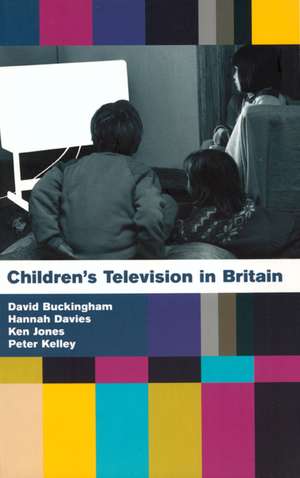Children's Television in Britain: History, Discourse and Policy
Autor Hannah Davies, Peter Kelleyen Limba Engleză Paperback – mar 1999
Preț: 229.50 lei
Nou
Puncte Express: 344
Preț estimativ în valută:
43.91€ • 45.85$ • 36.34£
43.91€ • 45.85$ • 36.34£
Carte disponibilă
Livrare economică 14-28 martie
Preluare comenzi: 021 569.72.76
Specificații
ISBN-13: 9780851706856
ISBN-10: 0851706851
Pagini: 200
Dimensiuni: 154 x 233 x 17 mm
Greutate: 0.28 kg
Ediția:1999
Editura: British Film Institute
Colecția British Film Institute
Locul publicării:London, United Kingdom
ISBN-10: 0851706851
Pagini: 200
Dimensiuni: 154 x 233 x 17 mm
Greutate: 0.28 kg
Ediția:1999
Editura: British Film Institute
Colecția British Film Institute
Locul publicării:London, United Kingdom
Cuprins
Introduction.-
defining
the
child
audience;
for
the
children.-
children's
television
1946-1980.-
run
the
risk
toward
a
political
economy
of
children's
television.-
vision
on
mapping
the
changes
in
children's
programming.-
wise
up
the
function
and
practices
of
audience
research.-
look
who's
talking
how
media
producers
define
the
child
audience.
Textul de pe ultima copertă
The
rise
of
more
commercially-based,
global
media
has
significant
implicaitons
for
the
child
audience.
Many
are
concerned
that
the
public
service
tradition
of
children's
television
is
threatened,
and
that
quality
and
diversity
in
programming
will
be
impossible
to
sustain.
This
book
challenges
the
romantic
nostalgia
that
surrounds
contemporary
discussions
of
the
subject.
Based
on
an
extensive
research
project,
it
provides
a
critical
review
of
the
history
of
children's
television
in
the
UK,
and
a
realistic
assessment
of
its
future
prospects.
It
looks
at
how
broadcasters
have
defined
the
child
audience;
at
the
changing
nature
of
children's
programming;
at
the
impact
of
commercial
competition
and
new
technologies;
and
at
the
role
of
audience
research.
The
books
contributes
towards
debates
about
the
regulation
of
children's
television;
and
it
offers
a
case
study
that
will
be
of
more
general
interest
to
students
and
academics
in
the
field.












